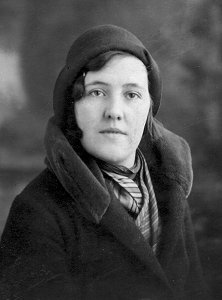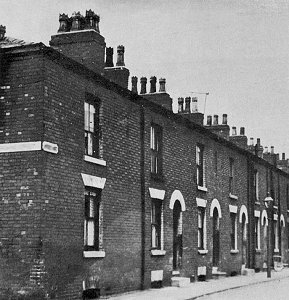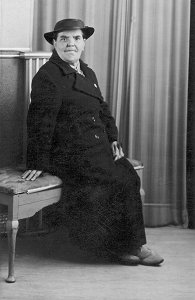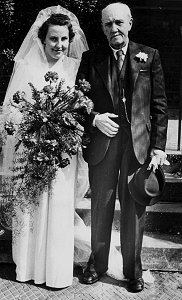|
My earliest memories of the old house, the one in which my mother grew up, date back to the late thirties when I was still a toddler. At the time, much to the consternation of my brother and me, she still referred to the place as 'home'. 'I'll be going home tomorrow,' she would say to Dad. Home! How could she possibly be going home? Wasn't she already at home, our home? Was she trying to tell us in a roundabout way that she was going to leave us? Of course not! Nevertheless, the following morning we sighed with relief when she took us with her.
Getting there was a kind of adventure. We caught a number 9A bus, (later changed to 3A) at the bottom of the street. Riding was a pleasant change from walking everywhere to save a few pennies. It being wartime, the council had camouflaged the bus like a battleship, covering it from top to bottom with a coat of dull grayish green paint. To confuse possible invaders, they had obliterated their proud insignia and any other signs of identification, and the little window above the cab displayed no destination A conductor in a dark blue uniform supervised us as we boarded the vehicle. Slung over one shoulder he wore a leather satchel on a leather strap, and over the other a little printing machine. When we tendered our fares, he placed the money in the satchel, dialled the fare on the printer, turned a handle and tore off our tickets as they emerged from a slot at the front. We got off the bus at the Coach and Horses, a mock Tudor public house built to look like an old coaching inn, crossed the main road and made our way to Wright Street, the street in which Mom had grown up. Springfield, the district in which in which it was located, is an inner suburb which the Birmingham canal, two mainline railways and a mess of goods yards and workshops cut off from the city's main business centre in the nineteenth century. Unlike the estate on which we lived, there were no streets formed in arcs, crescents and circles, and no front gardens. Instead long straight streets of long dark terraces ran continuously from corner to corner, doors opening directly onto pavements. Any rustic tranquility that the district's name suggests had long disappeared. When mom's family moved there in the 1910s, Cannock Road and the housing that had grown ribbon-like along it, was the edge of town. Wheat grew in the fields now called Fowlers Park, and beyond the 'Old Line' lay open country. On Sunday mornings when grandad was at home, the children went for long walks 'over the fields'. These outings together with afternoon visits to Sunday school gave some relief and personal time to their parents. Located one street away from Cannock Road, Wright Street was a cul-de-sac - or in local parlance 'puddin' bag' - that ran from the street now called Badger Drive in the direction of the railway lines. It had been built in the mid Victorian era by some speculative builder or entrepreneur (probably named Wright) as low rental accommodation for working men and their families who had flocked to the city as the Industrial Revolution progressed, and was one of the worst streets in the district. Never anything other than a slum, two terraces, each divided into twelve tiny dwellings ran its full length and only a strip of bitumen down the middle differentiated it from those infamous courts built about the same time. Houses were mostly of the two-up, two-down kind, though those adjacent to the four entries that led to the back of the houses - number nine where my grandparents John and Amelia Bolus lived was one - had a tiny extra bedroom above the passageway.
There was something monochromatic about the street. Sunlight rarely entered its short and narrow confines. The narrowness exaggerated the height of the buildings and created a closed-in feeling. Over the years, fallout from the nearby railways had coated the originally red bricks with grime, and harsh weather had raked out their mortar, and crumbled their corners, giving them a rumbled appearance. Grey Welsh slates that covered the roofs and blue bricks that formed the footpaths added to the effect. Even the lace curtains at the windows were dingy yellow. Only the hopscotch courts that children had chalked on the street, and the pierced hearts and cricket stumps they had drawn on the walls provided any relief, and the rain soon washed those away. Mom's parents, our grandparents, lived, at the top end of the street, and much as I enjoyed visiting them, negotiating the hundred or so metres to their home always filled me with dread. It was always so quiet. By the time we arrived, the few children who had not grown up and left home were at school, and those adults who were not serving in the forces had left for work. Fearful that a front door might suddenly open, some stranger reach out, grab me and drag me inside, I always proceeded with caution. At the same time, I tried my hardest not to trip over the displaced edges of pavement bricks or tread in the dog poo that lay about. (I rarely reached the house without soiling my shoes or falling over and bloodying a knee.) Mondays were the worst times to visit. These were the traditional washdays when housewives attached clotheslines to metal brackets on the fronts of houses and strung wet clothes across the street like neat rows of bunting that extended across the pavements. To reach the top of the street, we had to thread our way through a maze of wet clothing. There is an old saying, 'it always rains on Monday'. And rain it did; usually when the clothes were almost dry, everyone rushing out to bring them in. No sooner than they retrieved them than the showers stopped, the sun broke through, and out went the clothes again. This could happen several times. On very wet days, washing was strung across family rooms, and fires lit to dry it. And, it wasn't just rain that upset washing days. Smuts from the railway often settled on the clothes and they had to be rewashed. We never knocked on grandad's front door. Only officials: policemen, landlords and the dreaded telegraph boys on bicycles who brought bad news from the front in small leather pouches, had that privilege, their knocks, echoing though empty rooms, ND sending waves of anxiety throughout the house. Like all friends and relatives, we negotiate the entry that ran from front to back, a narrow unpaved tunnel whose floor rivulets of rainwater had scooped out, and which sudden downpours rendered practically impassible . Life at the rear of the houses was very different to that at the front. Everyone lived 'outback', six families sharing each backyard. We entered my grandparent's house through the back door and immediately found ourselves in the family room or 'back kitchen' as it was known. I can still recall the scene. Grandma was, as always, sitting in her rocking chair, the one she had used when nursing her many children. As soon as I saw her, I ran over to her, keen to be regaled with tales of the pussy cat who 'went to London to see the queen', or be tickled by fingers that went 'round and round the garden like a teddy bear'. Grandad sat in his easychair beside the fire reading 'The Daily Express' and clouding the room with blue smoke from his pipe. He was quite happy to remain in the background while Mom and her mother exchanged notes on motherhood. A large cast iron fireplace with a small grate in the middle, ovens and hobs on either side, and two swinging arms for hanging cast iron kettles on, provided a focal point around which the whole family could gather. On the mantelpiece above it sat two imitation Chinese vases, a spill holder, a penny-swallowing negro's head money box, and a coronation shaving mug. Above them a cheap oval mirror provided the room's only concession to vanity. Old, well worn furniture jam-packed in the room. A well scrubbed and ridged white pine dining table was pushed back against one wall when not in use. An Edison cylinder phonograph with a small brass horn sat on a sewing machine folded away to form a small table. Apart from grandma's rocking chair, a dozen or so other chairs left very little space to move about. A gas oven, a late out of place addition, occupied one corner. Despite its shabby lived-in appearance, the house was a home that possessed a homeliness and intimacy ours had not yet acquired. All its life crammed into one small space, it resembled an antique shop that fascinated me. Each time we visited, I discovered more and more about it. My relationship with grandma, much as I enjoyed it, didn't last for long. In 1941, when I was four years old, doctors diagnosed the stomach pains from which she was suffering as cancer. Too far advanced to be operated on, they gave her just a short time to live. The old lady's reaction to the news surprised everyone. A superstitious woman who all her life had positively refused to have her image recorded on film, she, despite her condition, walked into town, went to the Jerome Studio in Dudley Street and had her photograph taken. When the prints were ready, she gave one copy to each member of the family. 'A memento mori,' she said.
Her illness changed our lives dramatically. Instead of visiting as and when it suited us, we began to visit every day. Mom and grandad kept me in the dark about her condition - such things were not for the ears of children. If there were things of serious content to be discussed, they sent me to play with the little girl next door. We played quite happily together. A walking stick that hung like a schoolmaster's cane from a nail driven into the picture rail, a mackintosh, a scarf and a trilby on the back of a door providing me with great histrionic possibilities, and many times, in imitation of old men, I hobbled up and down the narrow entry, the walking stick in my hand as tall as a shepherd's crook, and a hat, big enough to rotate freely, on my head. If she were not at home, I explored the tiny backyard. There, sights, sounds and smells strange to my senses met me. Springfield part of town far busier than ours, I heard electric trolley buses that drew their power from overhead wires swish up and down Cannock Road at frequent intervals, screech to a halt outside nearby shops, pick up passengers, and motors humming and whirring move away with great traction. From the nearby railways, a whole range of noises assaulted my ears. Express trains carrying troops and civilians whooshed through the GWR cutting, or rattled across the LMS viaduct. Still the Age of Steam, pannier tankers and Matchbox class locomotives marshalled and shunted coaches for the carriage repair yards. They puffed, chuffed, clanged their buffers, whistled instructions to shunters and signalmen, applied their brakes with a squeal of metal on metal, and let off excess steam. To accompany these noises, a combined smell of steam, smoke and oil peculiar to railways permeated the air. (Years later, on Saturday afternoons in the season, clear cries shouts of 'goal', 'foul' and 'corner', and "ooh" and "aah" as shots 'sailed over the crossbar' or 'shaved the far post' reached me from the nearby Molineux, and kept me up to date with the team's progress. These were sounds I did not mind, particularly when, after the war, the Wolves were enjoying one the best periods in its history.) Sometimes, a sweet sickly smell of fermenting mash and infusing hops, an odour strong enough to put even hardened drinkers off their ale, escaped from behind the high brick walls of William Butler's 'famous' brewery. Unpleasant though this was, it was far more tolerable than the stench of hooves and bones being processed that occasionally wafted over from Bone Mill Lane. The only thing in the backyard that interested me was the communal wash house, a small brick building that served six families. With only a small iron framed window and no electric light to illuminate it, it resembled a gloomy cavern. Above its shallow earthenware sink, an enormous brass tap constantly dripped. To heat water in the copper boiler located near the door, tenants had to light fires beneath it, often carrying glowing coals from the kitchen on a shovel. The dark space beneath this boiler where the fire went frightened me. Who knew what strange creature might be lurking there? I had to summon up all my courage to peer under and find out. The houses had no internal plumbing, not even a single tap. To prepare food and wash themselves in the family room, families used enamelled jugs or bowls to fetch water from the washhouse. Bath night was usually Saturday. To have a bath, they brought the large zinc bath that hung on an outside wall inside and placed it on the hearth. They then immersed themselves in water from the washhouse tempered with hot water from the huge cast iron kettles all times suspended over the fire. They took turns to bathe themselves in the same water keeping it warm with fresh additions from the kettle. Rather than do this, many used the public baths in Bath Road or at Heath Town. Every household kept a mangle outside the back door. After boiling the washing in the copper, using a stick to ladle it into a zinc tub and then pounding it with a 'dolly' or 'posh' to release dirt, the woman of the house, sometimes aided by the children, ran it through the mangle's clanking rollers to squeeze out excess water. Three families shared the communal loo that sat in one corner of the backyard. A small brick building, its wooden door had been undercut so you could see if anyone was at home. I hated the place and avoided using it for as long as I could; only going there when the call of nature reached a crescendo. Many years of use had badly crazed its brown earthenware pan, and the flushing system, a cast iron cistern mounted just under the ceiling, was a nightmare. No matter how many times I yanked the chain that dangled from it, I could never get it to work. Only those who used it regularly had the knack. (A family joke associated the clanking noise it made with the ghosts of Jacob Marley and Christmas Past). No artificial lighting, visits after dark had to be made by torchlight (a bit of a problem during the blackout). Before the current flushing system had been installed, a banger box occupied the space, one that the night soil gang, known locally as the 'gravy train', emptied at regular intervals. Soon tired of exploring the backyard, I plucked up courage and, despite strong instructions never to do so, ventured down the entry into the deserted street. Three doors up from my grandparent's place, a six foot high wall brought the street to an abrupt halt, as if the builder someday intended to extend his little empire. This wall, adorned as it was with chalked cricket stumps and hearts and arrows, intrigued me. What, I wondered, lay on the far side? Older boys scaled the wall like monkeys and sitting on the top surveyed the hinterland. Had I been able to do the same, I would have discovered the back yard of the 'Wagon and Horses' with its empty crates and skittle alley; and, beyond that the railways; even seen an express train rush by. When the arrangements for attending to their sick mother were agreed, the morning shift fell to Mom, the only daughter of four who was not employed. It was a decision that did not please her. Wasn't her cup already full to overflowing? Didn't she have to drop off and pick up my older brother Alan twice a day from St. Faith's on the corner of Park Lane and Cannock Road? Didn't she have to queue for meagre rations and eke them out to provide nourishing meals for a husband who worked long hours, seven days a week at the aircraft factory? Weren't the enemy just across the Channel and air raids frequent? Oh, she grumbled and griped a bit, but in the end accepted the imposition in good heart. Grandma's health deteriorated rapidly. To make their lives easier, her carers brought a bed downstairs and set it up in the cold, inhospitable and rarely used front room. Without furniture or floor covering, it was an awful place for her to spend her final days. Generations of wallpaper, stuck on with flour-and-water paste, were beginning to peel off its cold damp walls. Grandad's old sit up and beg bicycle - one he continued to ride well into his seventies – leant awkwardly against the tiny fireplace, and framed pictures of Churchill and King George VI looked down on her. Even a fire in the grate couldn't cheer up the place .Lying there, she would have heard the cries of happy children playing in the street, and housewives gossiping as they hung out the washing. It was a sad ending for someone who, like many other mothers at the beginning of the century, had borne at least ten children, five boys and five girls, one, a boy, dying in infancy, another, a girl, in her late teens. Left me very much to my own devices while Mom was busy caring for her father and mother, I sat quietly on her chair with my legs folded neatly beneath me, like some eastern mystic. Contemplating the room, I absorbed every minute detail of its contents. The experience together the stories my parents had told me, enabled me to imagine the sort of life Mom and her siblings must have led in the early part of the century. How, I wondered, could so large a family have fitted into so small a house? How could they have managed to live together without a great deal of squabbling and strict discipline? And how could they have managed to survive on one man's wage? Grandad may have worked his way up from railway labourer (porter) through shunter to brakesman (guard). but after he had deducted his beer and baccy money, there would have been very little left to feed and clothe his ever growing brood. AND, how could he and grandma have found the time, privacy, and inclination to increase their tribe? Like animals into the ark, the chairs, all secondhand, had entered the house two by two. There were two spindle-back, two ladder-back, two bentwood, and two brocade. Grandad's dining chair had a captain's chair with arms, 'grandma's a matching chair without. Grandad's easy chair located one side of the fireplace reclined, grandma's located on the other didn't. The only unpaired chair in the room was grandma's rocking chair. Her favourite, no-one else was allowed to sit on it, not even after her death. Every child had his or her own personal chair, and woe betide anyone else who tried to sit on it. It served them as both dining and all purpose chair. Even when they were grown up and came to visit they still sat on it. Mom's, a brocade one, was threadbare but more comfortable than the others. Although located near the draughty back door, she used it when she was the only visitor, and grandad, seated on the far side of the room as carrying on a conversation with her. As if living in a grand house, the family, when it sat at the table, took up positions according to seniority. Grandad sat at the head, the children graded down by age to grandma at the far end, a position from which she could feed and manage the younger ones. The large cupboard next to the fireplace contained a mish-mash of crockery and eating utensils. Like the chairs, everyone had their favourite style and pattern. This cupboard contained very little else; a loaf of bread, a pat of butter or margarine and a lump of cheese, perhaps. All other food was fetched as and when needed from the small shops on Cannock Road.
However, one other item kept in the cupboard interested me greatly. This was grandad's glory box, a cigarette tin which contained old military and railway buttons, a couple of regimental badges and a small collection of foreign coins, the Chinese ones having holes in the centre so they could be threaded onto a cord. Apart from a silver half hunter watch presented to him when he retired, and a penknife which he always kept in his pocket, this collection formed practically the total sum of his personal possessions. A redundant gas bracket on the wall reminded me of earlier times when the soft yellow glow of gas or oil lamps illuminated the rooms, and flickering candles 'lighted the children to bed'. The electrical system, that had later replaced it, had been installed in a primitive and probably illegal manner. Exposed cotton wound wiring ran around the picture rail, and crossed the ceiling to a single light rose. Dangling from this, a low powered light bulb hidden from view by a grubby pink fly blown glass bowl inadequately illuminated the place. Power points were non existent. A two-way outlet fitted in the ceiling rose supplied power to a wireless set sitting on a shelf above the door to the front room, the wire once again running across the ceiling. To use any other appliances, the wireless had to be disconnected and the new connection plugged in. A staircase just inside the back door led to the first floor, its entrance concealed by a tattered curtain. The space beneath this was used to store coal. To reach this 'coal-hole', the coal merchant, who often arrived at mealtime, had to carry his heavy sacks through the family room. A hessian sack draped over his head and shoulders, he weaved his way through the furniture, and left a trail of coal dust in his wake. Sleeping arrangements upstairs must have been very tight. As the family increased in size, the smallest infant would have shared the front bedroom with his parents - at least, till the next one came along. The five girls slept top to toe like sardines in the back bedroom, and the five boys shared a bed in the bonus bedroom and one on the landing. (Surely, the front room downstairs could have been utilised as an extra bedroom.) A couple of times during grandmother's illness, the town blacked out and, air raids likely, Mom, Alan and I stayed overnight, Alan and I sharing a single bed in the 'extra' room. Seldom used, the room had no light bulb, so we were, you might say, completely in the dark about its appearance. Alan, who had once seen it in daylight, told me that an etching of the crucifixion hung above the bed head, and a portrait of Baden-Powell, one dating back to the hero's Boer War days, hung on another wall. Since there was no bulb in the socket, Mom told us not to use the light switch or electricity would escape into the room. This was a common myth that probably dated back to days of gas lighting. Trying to keep the house clean was a thankless task. The back-kitchen floor consisted of red quarry tiles laid directly on compacted earth. Before they could be cleaned, the cleaner had to remove an odd assortment of rugs, take them outside, and bang them against the wash house wall to dislodge dust. After the floor had been swept with a soft broom, she then got down on her knees - a cold and painful experience - and washed the floor with a cloth soaked in warm soapy, disinfectant laced water. As soon as it was dry, she went down on her knees again and polished the tiles with 'lamp oil' (paraffin). The cast iron cooking range had to be black leaded at least once a week. Cleaning windows was a waste of time. No sooner had they dried than smoke from the nearby railway coated them with a film of oily grime which not even rain could shift. The soft sandstone front doorstep, although rarely used, was regularly honed with a pumice stone, the cleaner once more getting down on her knees . A clean step was a matter of public pride, one that had hollowed all such steps in the street. When it came to keeping the place tidy, grandad played the part of helpless male to perfection. An avid reader, he spread out newspapers and magazines like Picture Post, Illustrated, John Bull, and the London Illustrated News on the dining table and after reading them, left them there. As soon as Mom arrived, she gathered them up, folded them neatly and stuffed them under the cushion of his easy chair. Not that that made the slightest difference. As soon as we left, out they come again, and remained on the table until the next time we visited. Grandma died just before the Christmas. Although long anticipated, the event quite nonplussed Mom and one of her sisters who at the time were attending to the old lady. What were they to do? Amelia herself had sorted out all previous deaths. Finally, resorting to hearsay, they washed her body, dressed it in a clean nightdress and placed pennies on her eyes to make it look as if she were sleeping. They then drew the curtains, and left her to sleep in the dark. The old lady had not died of anything contagious, but after some deliberation they sprinkled lamp oil on her old nightdress and sheets and burnt them in the back yard – 'just in case'. Soon neighbours, noticing the closed curtains, called in to offer their condolences. The funeral took place on the following Saturday, my fifth birthday. The grown ups thought the experience might be too much for Alan and me, so we were not allowed to attend. 'Too much'! What nonsense! At an age when so many things were new to us, to miss out on any new experience disappointing. Hadn't we already heard the sound of sirens in the night, heard bombs fall from the sky, and spent hours in Anderson shelters? Hadn't we taken these in our stride and without a murmur accepted them? (Might ask too many awkward questions was more like it!) As a 'special treat', they persuaded Gwenny, an older cousin who would also have preferred to see her grandmother buried, to take us to the cinema. No Disney films on, Mom thought a film called the Black Cat showing at the Queen's might be suitable. Far from it! How they allowed a fourteen year old and two youngsters in to see it, I cannot imagine. Perhaps film classification had not yet been introduced, or, as was widespread at the time, we stood outside the cinema and begged an adult to take us in. Adapted from Edgar Allan Poe's story of domestic disharmony and homicide, and, costarring Boris Karloff and Bela Lugosi for the first time, it was far from Disney-like. If I hadn't slept through most of it, it might have damaged me far more than any funeral. One week after the burial, the family met again at the old house, this time to celebrate Christmas. A sombre affair, it was certainly the most frugal celebration I have ever experienced. With food rationing, meat allowances were miniscule, and poultry, unless you had bred it yourself, very scarce. Aunt Elsie who was in business somehow managed to obtain a duck, but you can imagine how far that went between eight adults and four children. Frost affected potatoes bought at the last minute from around the corner turned black when they were cooked; the boiled sprouts that accompanied them were far from appetising. For me, the only bright spot came when the crackers were pulled and I got the best gift, a small china cat - black of course. Young though I was, that Christmas was the end of an era. With the new year, I started at St. Faith's Infant School. Mom continued to regularly visit the old home to make sure grandad was looking after himself, to gather up his dirty shirts and shop for his rations. Apart from weekends and holidays, I rarely accompanied her. In the following years, as I became more and more independent, visits became fewer and fewer. Grandad somehow managed to survive on a diet of bread, cheese and beer, cycling two streets away to the Springfield Working Men's Club where he served on the Committee. He stayed in the old house until in the mid fifties the authorities demolished the street and replaced the houses with council flats. The old street that had influenced my early years, no more, he moved in with one of his younger sons and daughter in law, and remained there until he died in 1957 at the age of eighty-six. |







